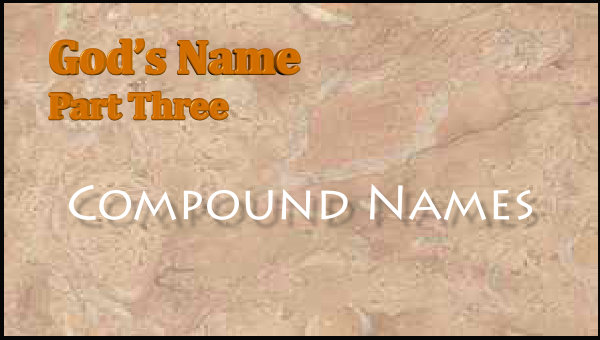By Tyson Thorne

Today we continue learning about the compound names of God. If you have not read parts one and two of this study, you should start there.
Jehovah M’kaddeshkem means “the Lord who sanctifies you” and pronounced Add-oh-nigh Meh-cad-eesh-chem. The first use of this name is found in Exodus 31.12-13 and is made reference to by Paul in his letter to the church in Thessalonica (1 Thessalonians 5.23-24): “Now may the God of all peace himself make you completely holy and may your spirit and soul and body be kept entirely blameless at the coming of our Lord Jesus Christ. He who calls you is trustworthy, and he will in fact do this.” Theologically speaking, God is responsible for our spiritual growth toward, and ultimate fulfillment of, perfect holiness. Jehovah Nissi means “the Lord is my banner” and is pronounced Add-oh-nigh Niss-see. Two images are evoked through this Hebrew conjunction, the first being that of a banner carried high into battle. A nations banner is first to enter the conflict, just as the Lord goes before us into any conflict. Along with “banner” or “pole” Nissi may also mean “miracle”. If we rally to God in our times of trouble he will deliver us victory, miraculously or otherwise. The origins of this name derive from Exodus 17.14-16.
Jehovah Qanna means “the Lord is jealous” and is pronounced Add-oh-nigh Kan-nah. This is another name God gives himself, this time in Exodus 34.12-14 and describes an aspect of God’s love for his people. Normally jealousy is a sin when it turns to coveting something we do not have or resentment of another’s success. But jealousy can also be constructive, as Paul notes to the church in Corinth: “For I am jealous for you with godly jealousy, because I promised you in marriage to one husband, to present you as a pure virgin to Christ” (2 Corinthians 11.2).
Jehovah Rohi means “the Lord my Shepherd” and is pronounced Add-oh-nigh Row-hoe-ee. This is the name used by David in the 23rd Psalm and a name Jesus uses of himself in John chapter 10: “I am the good shepherd. The good shepherd lays down his life for the sheep.” He states this again in verse 14: I am the good shepherd.” Jesus’ use of this name was another claim to deity, to being the God of David.
Jehovah Rophe means “the Lord your healer” and is pronounced Add-oh-nigh Row-fay. The backstory of this name is interesting. Moses had been leading the people through the desert and when they came to Marah they were anxious to drink and fill refill their canteens and provisions. The water there, however, was bitter and not healthy to drink. The people were greatly upset and troubled and in need of water so God showed Moses how to make the water safe for drinking. God then said this to the people: “I you will diligently obey the Lord your God, and do what is right in his sight, and pay attention to his commandments, and keep all his statutes, then all the diseases I brought upon the Egyptians I will not bring upon you, for I, the Lord, am your healer.” He then went on to lead them to a place with a wealth of drinking water. (Exodus 15.26)
Jehovah Shalom means “the Lord of peace” and is pronounced Add-oh-nigh Sha-loam. Gideon uses this compound name for God in Judges 6.24, and is likely a play on God’s opening words to him, “Peace to you.” Jesus Christ came to make peace between God and man, reconciling all through his blood (Colassians 1.19-20).
Jehovah Shammah means “the Lord is there” and is pronounced Add-oh-nigh Sha-ma. This is the name given a city that is described by the prophet Ezekiel, “The circumference of the city will be six miles. The name of the city from that day forward will be: ‘The Lord Is There.’” (Ezekiel 48.35). This is prophecy related to the new Jerusalem also described in Revelation chapters 21 and 22.
Jehovah Tsidkenu means “the Lord is our justice” and is pronounced Add-oh-nigh Sid-u-cay-no. This name appears only in the book of Jeremiah (23.6 and 33.16). In these two cases the Lord becomes justice when those who are supposed to uphold justice fail to do so. There is always hope for wrongs to be righted as long as the Lord lives!
Next week we will finish our study of the names of God found in Scripture and Rabbinical literature. This weekend, why not practice praying to God and using one of these names in your conversation with him?
|
|
